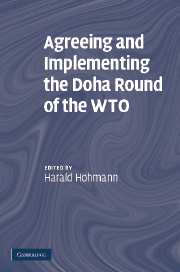Book contents
- Frontmatter
- Contents
- List of Contributors
- Foreword
- Introduction
- The future of the Doha Round
- PART ONE Development policy of the WTO
- PART TWO Trade policy (including competition) and trade facilitation
- 6a Trade policy objectives in the Doha Round – A European Union perspective
- 6b The final phase of the Doha Round
- 7 Further liberalisation of trade in chemicals – can the DDA deliver? A summary of the chemical industry's position on the Doha Development Agenda
- 8 Trade facilitation within the Doha Round: A critical review of recent efforts of the WTO and other international organizations (1996–2006)
- 9 ICN accompanied convergence, instead of WTO imposed harmonization, of competition laws
- 10 Legal principle of integration in the Doha Round: Embedding a social order in the global market
- PART THREE Reform of the dispute settlement system
- PART FOUR Social rights, health, and environment
- PART FIVE Conclusions
- Index
9 - ICN accompanied convergence, instead of WTO imposed harmonization, of competition laws
from PART TWO - Trade policy (including competition) and trade facilitation
Published online by Cambridge University Press: 23 February 2010
- Frontmatter
- Contents
- List of Contributors
- Foreword
- Introduction
- The future of the Doha Round
- PART ONE Development policy of the WTO
- PART TWO Trade policy (including competition) and trade facilitation
- 6a Trade policy objectives in the Doha Round – A European Union perspective
- 6b The final phase of the Doha Round
- 7 Further liberalisation of trade in chemicals – can the DDA deliver? A summary of the chemical industry's position on the Doha Development Agenda
- 8 Trade facilitation within the Doha Round: A critical review of recent efforts of the WTO and other international organizations (1996–2006)
- 9 ICN accompanied convergence, instead of WTO imposed harmonization, of competition laws
- 10 Legal principle of integration in the Doha Round: Embedding a social order in the global market
- PART THREE Reform of the dispute settlement system
- PART FOUR Social rights, health, and environment
- PART FIVE Conclusions
- Index
Summary
Change of forum
Competition had a short-lived career in the WTO negotiations. It was identified as one of the four new subjects at the Singapore Ministerial Conference in 19961 and was unloaded from the agenda of the Doha Round in the aftermath of the Cancún Ministerial Conference in 2003. Whether competition will be given a second chance as a WTO subject after the conclusion of the Doha Round is doubtful. Pascal Lamy, while Trade Commissioner of the EC one of its main promoters, first seemed determined to take it on board again despite its contributory role to the debacle of the Cancún meeting. Having become Secretary General of WTO, he may now have other more pressing concerns. Above all, the worldwide expansion of competition law has meanwhile found a more accommodating forum: the International Competition Network (ICN).
This chapter will first outline what the ICN is about and then discuss which of the functions originally to be assigned to the WTO the ICN can be expected to fulfil and whether there are functions that still need to be entrusted to the WTO, possibly at a later stage. The balance, it will be shown, is clearly in favour of a continued primary involvement of the ICN. Instead of being burdened by another potentially controversial subject, the WTO should devote its considerable energies to its core functions of promoting trade liberalization, especially in the fields of agriculture, services and public procurement.
- Type
- Chapter
- Information
- Agreeing and Implementing the Doha Round of the WTO , pp. 223 - 234Publisher: Cambridge University PressPrint publication year: 2008



